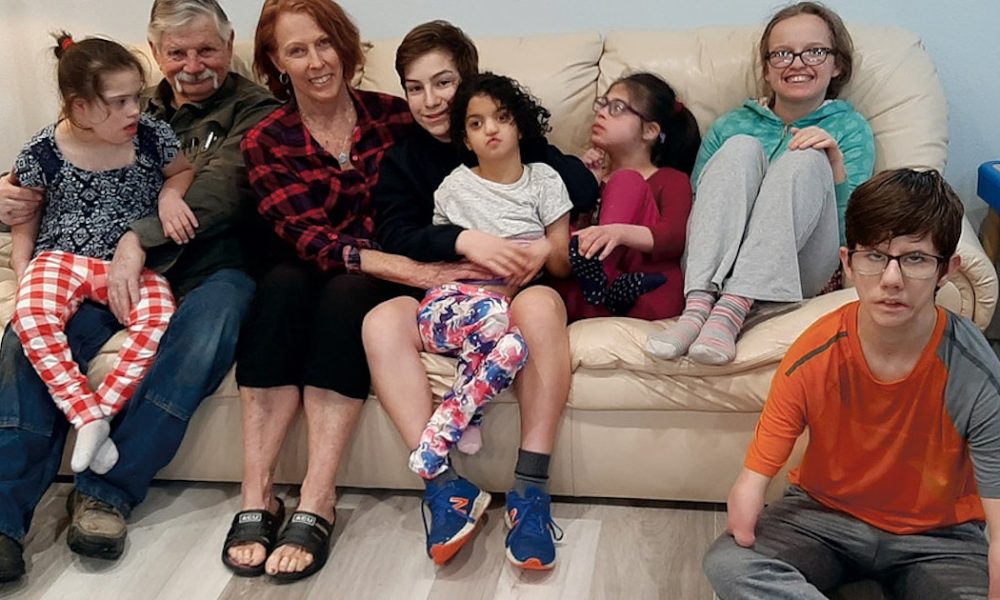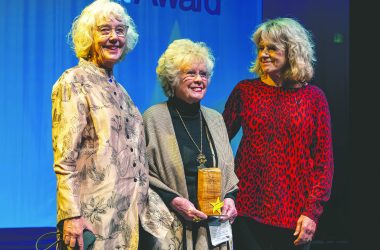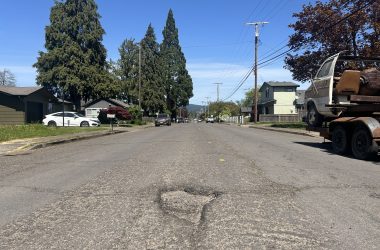 Don and Lauren Horton, of Springfield, have adopted eight children with special needs. Pictured, from left are, Ella, 13; parents, Don and Lauren; Taylor, 14, with Sophia, 11 on his lap; Victoria, 12; Michelle, 14; and Joseph, 14. Erin Tienrey/The Chronicle
Don and Lauren Horton, of Springfield, have adopted eight children with special needs. Pictured, from left are, Ella, 13; parents, Don and Lauren; Taylor, 14, with Sophia, 11 on his lap; Victoria, 12; Michelle, 14; and Joseph, 14. Erin Tienrey/The Chronicle
SPRINGFIELD – Some memories marinate in your mind for decades before bubbling up in a quiet, powerful resonation.
Springfield resident Lauren Horton was a kindergarten teacher in California. Though this was years ago, she still vividly remembers one particular little girl in her classroom. She was an adopted child from China with a physical disability; her head was flat in the back as a result of her time in an orphanage.
”She had laid in her crib her whole life before being adopted,” Horton explained. ”It’s so interesting because I just remember that little girl … really clearly.”
Over 20 years later, Horton and her husband, Don, have 11 children, eight of whom were adopted with special needs. Four children were adopted through the foster care system, and four through an orphanage in Bulgaria.
The Hortons began their adoption journey in 2000, when their youngest child was in the third grade.
”We just felt blessed with three healthy, high functioning kiddos,” Lauren said. ”Don and I feel like we have to be put on this earth to do more than just taking care of ourselves.”
They weren’t necessarily looking to adopt a child with special needs, Lauren said. They looked through binders full of foster children profiles and Sabrina, a 1-year-old girl with Down syndrome caught their eye.
Sabrina, now 21, ”opened our eyes to special needs children,” Lauren said. Since then, the family has adopted Emily, 20; Joseph, 14; Michelle, 14; Taylor, 14; Ella, 13; Victoria, 12; and Sophia, 11. Seven still live at home; on Friday nights, all 11 kids and the Horton’s six grandchildren gather together at the family home for pizza night.
One of Lauren’s biggest roles as Mom is to be an advocate for her children, who have an array of special needs, including Wolf-Hirschhorn syndrome, fetal alcohol syndrome Moebius syndrome, cerebral palsy, autism, Down syndrome as well as cognitive and emotional disorders.
One of their daughters was 8 years old and weighed nine pounds in the orphanage in Bulgaria, Lauren said. Another child of hers was 4 years old and weighed 10 pounds when adopted.
”You think, ‘that has to be a typo,’ that it is not even possible,” she said. ”They looked like starving babies. Their bodies just stopped growing from a lack of love and nutrition.”
Victoria, with Down syndrome and cerebral palsy, is the Horton’s most recently adopted child.
”She was in the same orphanage where Sophia came from. We knew that orphanage. We walked those halls and saw those kids. There are better orphanages, but there are no good orphanages. We are haunted by knowing how many kids are still there.”
After meeting Victoria, Lauren looked at her husband and asked, ”so what do we do?”
”What else can we do?” Don said. ”What’s our choice?’”
The choice for them was clear and they welcomed Victoria to the family.
The goal for the Hortons is to give them the best life they can at whatever level of function they are capable of, while always advocating medically, educationally for services for them, Lauren said.
”Whatever level of function they have is fantastic; I just don’t want to ever say that they can’t. I won’t say that my children are nonverbial because they might talk someday. There have been so many ‘nevers’ that they have busted through.
Sophia, with Wolf-Hirschhorn syndrome, learned to crawl at 9 years old, Lauren said. ”They said that she never would. She has always been so curious and nosey; it’s what kept her alive in the orphanage I think.
”What most of my kids have been through, we can’t even fathom,” Lauren said. ” It’s pretty incredible. I don’t want to say they are ‘resilient,’ because they didn’t have a choice in the matter. They are brave.”
Everyday, the Hortons learn their kids’ personalities.
”Children with special needs often come from trauma. We needed to learn a new parenting style,” Lauren said, ”though we are a little old-school in our parenting style. We adore them but we’re not their friends; we’re their parents. We have clear expectations and we expect respect.”
Ella, austic with Down syndrome, ”needs predictability and a place she feels like she is not overwhelmed. I think the world is really overwhelming for her – loud noises, commotions,” Lauren said. She also struggles with self-injurious behaviors and is described as a ”Houdini” when it comes to escaping her bed.
Ella recently won a Safety Sleeper as part of Abram’s Nation Pay-It-Forward Program, an enclosed bed used to keep her safe at home and in travel. As the summer nears, the Hortons look forward to bonding together outside, Lauren said, noting that she loves to pack up the family for the weekend and go. ”I think the kiddos see the reality of family,” she said. ”They know they are loved.”
The bond between siblings is strong. ”Ella and Sophia seek each other out. You wouldn’t think two kiddos – one with cerebral palsy and Down syndrome and another with Down syndrome and autism – would do that, but they depend on, and accept and care for each other,” Lauren said.
”We always look at things as a ‘glass half full,’ don’t we?” Lauren said, as she tousled Victoria’s hair back and smiled. ”Everyone deserves family.”
Their dad, Don, is a self employed electrician, ”a hard worker and huge hearted man,” Lauren said. ”He’s still working to support his family, even though he probably should be retired.” And after work, before he even gets a chance to change out of his work clothes, he is out in the front yard, throwing a football around with his sons.
”There is always something somebody can do because there is such a huge need in this world,” Lauren said. ”Whether that is orphans or widows or the homeless, we have to take care of our own. If we have the ability to help others in some way then we just have to do that. They become our family, they are our family. It’s not just a good thing to do; this is our whole life.”








